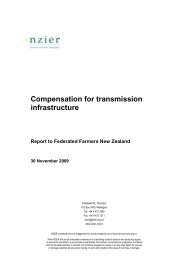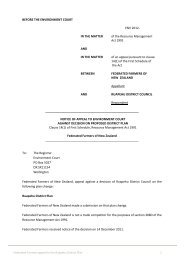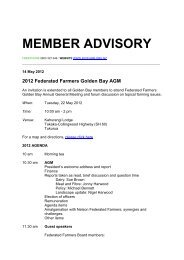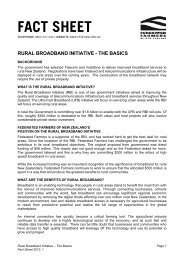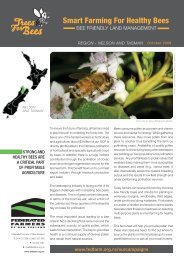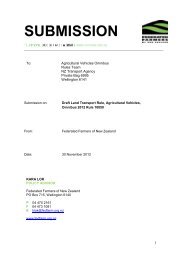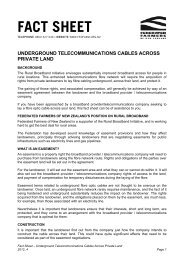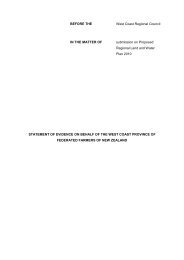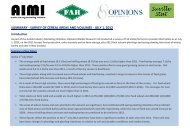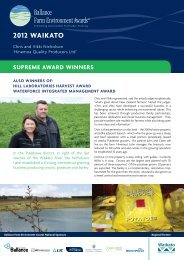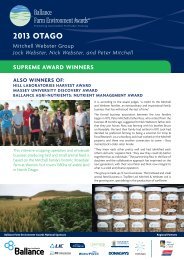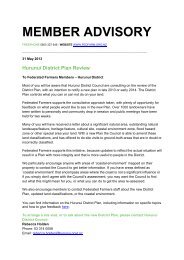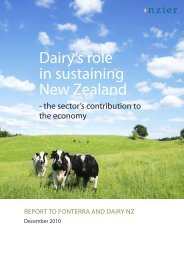Are you recruiting migrant workers? - Immigration New Zealand
Are you recruiting migrant workers? - Immigration New Zealand
Are you recruiting migrant workers? - Immigration New Zealand
You also want an ePaper? Increase the reach of your titles
YUMPU automatically turns print PDFs into web optimized ePapers that Google loves.
DOL 11919.1 MAY 12<br />
<strong>Are</strong> <strong>you</strong> <strong>recruiting</strong><br />
<strong>migrant</strong> <strong>workers</strong>?<br />
A guide for dairy farmers<br />
What do <strong>you</strong> need to know?
Why a guide?<br />
Migrant <strong>workers</strong> are increasingly important to the <strong>New</strong> <strong>Zealand</strong><br />
dairy sector because they are able to fill labour and skill<br />
shortages. Employing <strong>migrant</strong>s can be quite different from<br />
employing <strong>New</strong> <strong>Zealand</strong>ers and new <strong>migrant</strong> <strong>workers</strong> may need<br />
quite a lot of <strong>you</strong>r help, particularly at the start. This guide sets<br />
out what <strong>you</strong> need to know.<br />
As well as helping <strong>migrant</strong> <strong>workers</strong> do their job better, <strong>you</strong> will<br />
be helping them come to terms with living in a different culture<br />
and speaking <strong>New</strong> <strong>Zealand</strong> English. This guide will help <strong>you</strong> get<br />
the best from their time in this country and make their time in<br />
<strong>New</strong> <strong>Zealand</strong> more enjoyable.<br />
You may employ <strong>migrant</strong>s who have been in <strong>New</strong> <strong>Zealand</strong> for a<br />
while who will be more familiar with living and working on a farm<br />
- understanding them better may increase their productivity.<br />
ISBN 978-0-478-39147-3
Contents<br />
Why a guide? ...............................................................................................i<br />
How will this guide help <strong>you</strong>? ............................................................... 2<br />
Employing <strong>migrant</strong> <strong>workers</strong> – is it right for <strong>you</strong>? ........................ 3<br />
What do <strong>you</strong> need to get ready for <strong>migrant</strong> <strong>workers</strong>? .............. 5<br />
Have <strong>you</strong> got their accommodation sorted? ................................. 6<br />
Three areas of challenge for <strong>migrant</strong> <strong>workers</strong> ............................ 8<br />
What to do when new <strong>migrant</strong>s arrive ............................................ 9<br />
Everyone works in the same way don’t they? Yeah right! ...... 14<br />
Does it take a while to get <strong>you</strong>r message across? ................... 19<br />
Checklist .................................................................................................. 21<br />
A word about <strong>New</strong> <strong>Zealand</strong> employment law ...............................25<br />
A safe workplace................................................................................... 27<br />
Where can I go for more help? .........................................................28
How will this guide help <strong>you</strong>?<br />
This guide contains practical tips and tools to help <strong>you</strong> better<br />
understand and support <strong>you</strong>r <strong>migrant</strong> <strong>workers</strong>. It can be used<br />
by farm owners, farm managers, sharemilkers, and co-<strong>workers</strong><br />
of <strong>migrant</strong> <strong>workers</strong>.<br />
Find out how to:<br />
» prepare for <strong>migrant</strong> <strong>workers</strong><br />
» have fewer staffing headaches<br />
» save costs by retaining <strong>you</strong>r <strong>migrant</strong> <strong>workers</strong> longer<br />
» have happier more productive employees<br />
» add value to <strong>you</strong>r bottom line<br />
For queries about organising <strong>migrant</strong> visas or any compliance issues<br />
about employing <strong>migrant</strong> <strong>workers</strong> contact:<br />
<strong>Immigration</strong> <strong>New</strong> <strong>Zealand</strong> on 0800 55 88 55, or<br />
www.immigration.govt.nz/employers<br />
2 | A guide for dairy farmers
Employing <strong>migrant</strong> <strong>workers</strong> –<br />
is it right for <strong>you</strong>?<br />
But they’re not really – in fact they<br />
work hard and they’re very keen to<br />
learn how we do things here.<br />
Migrant <strong>workers</strong> can be a great asset to <strong>you</strong>r farm…<br />
here are some facts to think about:<br />
» Most <strong>migrant</strong> dairy <strong>workers</strong> are only here on a temporary visa.<br />
» All <strong>migrant</strong> employees are covered by <strong>New</strong> <strong>Zealand</strong> employment law.<br />
» Migrants might be used to different employer-worker relationships<br />
than we have in <strong>New</strong> <strong>Zealand</strong>, so <strong>you</strong>r style of managing them might<br />
need to differ from that used for a <strong>New</strong> <strong>Zealand</strong> employee.<br />
» Migrants may have limited experience of working on <strong>New</strong> <strong>Zealand</strong> dairy<br />
farms and might need a bit of extra training.<br />
» English might not be their first language, making it a bit more<br />
challenging to teach them the ropes.<br />
» Migrants come from different cultures and often value different<br />
things from Kiwis.<br />
3 | A guide for dairy farmers<br />
You might think that<br />
<strong>migrant</strong> <strong>workers</strong> sound<br />
like hard work.
Employing <strong>migrant</strong> <strong>workers</strong> is easier if <strong>you</strong> think ahead:<br />
» Employ <strong>migrant</strong> <strong>workers</strong> before <strong>you</strong>r work-load peaks so they have time<br />
to settle in.<br />
» Provide them with some information about living and working on <strong>you</strong>r<br />
farm and about the local area and community.<br />
» Advise them about the need for lots of warm clothing in <strong>New</strong> <strong>Zealand</strong>.<br />
» Prepare to give them some training about working on <strong>you</strong>r dairy farm.<br />
» Be aware that <strong>migrant</strong>s usually arrive here with only a suitcase, so<br />
providing fully-equipped accommodation will be really helpful.<br />
» Be aware that they may want to bring their family to live with them on<br />
<strong>you</strong>r farm.<br />
4 | A guide for dairy farmers
What do <strong>you</strong> need to get ready for<br />
<strong>migrant</strong> <strong>workers</strong>?<br />
» accommodation<br />
» an orientation programme<br />
» a welcome kit<br />
» <strong>you</strong>r existing staff – put them in the picture<br />
» prepare an employment agreement and provide a copy to <strong>you</strong>r worker.<br />
Much of this preparation will only need to be done once. Next time <strong>you</strong> employ<br />
someone <strong>you</strong>r accommodation and orientation programme will be ready.<br />
Tips from Kim Solly and Jeremy<br />
Casey, Canterbury sharemilkers<br />
and experienced employers of<br />
<strong>migrant</strong> staff.<br />
It makes a difference if <strong>you</strong>:<br />
◊ are patient and can appreciate other<br />
ways of doing things<br />
◊ are open-minded and interested in<br />
other cultures<br />
◊ can put <strong>you</strong>rself in the <strong>migrant</strong>’s<br />
shoes<br />
◊ have a sense of humour.<br />
Employment agreements and maintaining records<br />
<strong>New</strong> <strong>Zealand</strong> employment law applies to all <strong>migrant</strong> <strong>workers</strong>.<br />
Migrants are not familiar with <strong>New</strong> <strong>Zealand</strong> employment law and practice.<br />
It is all the more important for them to have copies of employment<br />
agreements and pay slips so that they can take their time to read and<br />
understand them.<br />
You must have a system of recording hours of work and leave taken by<br />
the employee. This can prevent disputes later.<br />
5 | A guide for dairy farmers
Have <strong>you</strong> got their accommodation<br />
sorted?<br />
6 | A guide for dairy farmers<br />
Well, for a start they find it really<br />
cold here and they are not used<br />
to living in houses like ours..<br />
Kiwi <strong>workers</strong> usually bring their own furniture. It’s pretty certain this<br />
won’t be the case for a new <strong>migrant</strong> worker. Furnishing a whole house<br />
would be a big investment for someone who may only stay in <strong>New</strong> <strong>Zealand</strong><br />
for a short period of time.<br />
Imagine what <strong>you</strong> would <strong>you</strong> need if <strong>you</strong> arrive to work in another country<br />
with just a suitcase. Consider supplying:<br />
» curtains, floor coverings<br />
» furniture – beds, table, chairs,<br />
couch, etc<br />
» pots and pans, and perhaps a<br />
rice cooker<br />
» crockery – plates, dishes, mugs,<br />
etc<br />
» cutlery – knives, forks, spoons,<br />
etc<br />
What’s so different about<br />
<strong>migrant</strong>s?<br />
» bed sheets, blankets or quilts,<br />
pillows and towels<br />
» cleaning equipment – vacuum<br />
cleaner, mop, etc<br />
» whiteware – fridge and washing<br />
machine<br />
» some basic foodstuffs<br />
» heating and/or firewood<br />
» internet connection
Migrant <strong>workers</strong> need on-farm accommodation that is in good repair,<br />
and is comfortable, warm, and well-equipped. Many <strong>migrant</strong> dairy <strong>workers</strong><br />
bring their family so the accommodation may need to be big enough for<br />
the worker and his/her family.<br />
Tips from Sharron Davie-Martin, winner of the 2011 <strong>New</strong> <strong>Zealand</strong><br />
Dairy Business of the Year:<br />
◊ Show new <strong>migrant</strong> <strong>workers</strong> how things are done here – because living conditions can<br />
be very different in <strong>New</strong> <strong>Zealand</strong>.<br />
◊ Show basics such as how to use cleaning equipment, how to operate cooking, heating,<br />
and washing appliances, where to put the rubbish, what can and can’t go down the<br />
sink, and explain why the house needs to be aired out.<br />
◊ Let them know that <strong>you</strong> will inspect the house from time to time.<br />
◊ Set clear expectations about keeping <strong>you</strong>r accommodation in good order.<br />
◊ Inform <strong>migrant</strong>s about what will happen if there is any damage to the property.<br />
7 | A guide for dairy farmers
Three areas of challenge for <strong>migrant</strong><br />
<strong>workers</strong><br />
8 | A guide for dairy farmers<br />
CloThINg<br />
Having the right gear for working on a<br />
farm is something <strong>migrant</strong> <strong>workers</strong> may<br />
need some advice about (for example,<br />
warm clothes for winter, wearing layers,<br />
and avoiding wearing cotton during winter).<br />
It is a legal requirement for <strong>you</strong> to supply<br />
all protective clothing and equipment for<br />
<strong>you</strong>r employees.<br />
ClIMaTE<br />
A lot of <strong>migrant</strong>s come from warmer<br />
climates. They say that one of the most<br />
difficult things about coming to work in<br />
<strong>New</strong> <strong>Zealand</strong> is getting used to the climate.<br />
CooKINg<br />
Most <strong>migrant</strong>s like to eat the foods they<br />
have grown up eating. It may help to find<br />
out where they can buy their own kind of<br />
food.<br />
Tip – In some cases it may be more helpful<br />
to provide a rice cooker instead of a<br />
toaster.
What to do when new <strong>migrant</strong>s arrive<br />
helping <strong>you</strong>r <strong>migrant</strong> <strong>workers</strong> to adjust will mean they<br />
will become better <strong>workers</strong>, faster.<br />
Tips from Justine<br />
Dalton, Business<br />
Manager, BEL Group<br />
9 | A guide for dairy farmers<br />
on arrival:<br />
» Meet <strong>you</strong>r <strong>workers</strong> when they arrive in<br />
town and give them a tour of the area.<br />
» Give them a welcome kit that includes<br />
local community information and<br />
important contact details (including<br />
<strong>you</strong>r own).<br />
» Show them how to use the domestic<br />
equipment <strong>you</strong> have provided – e.g.<br />
heating, washing, cooking, cleaning.<br />
» Help by showing them where to buy food,<br />
clothes, and other basic needs, and the<br />
location of schools and medical centres.<br />
» Give them some time to make personal arrangements such as opening<br />
a bank account and organising a mobile phone.<br />
» Help them get some transport, check they have a valid licence, and that<br />
they are safe behind the wheel (the <strong>New</strong> <strong>Zealand</strong> Transport Agency has<br />
a useful guide “What is different about driving in <strong>New</strong> <strong>Zealand</strong>” available<br />
at www.nzta.govt.nz/resources/whats-diff-driving-nz/).<br />
» Put on a social event to welcome <strong>you</strong>r new worker (and their family) to<br />
the team or to the neighbourhood.<br />
» Let them know about any social activities, religious groups or clubs they<br />
can join.<br />
» Make sure they get to have a chance to experience <strong>New</strong> <strong>Zealand</strong> and its<br />
culture.
WElCoME KIT<br />
Farmers in the amuri District have developed a<br />
welcome kit for their new <strong>workers</strong>. They sit down and<br />
go through the kit with their new <strong>workers</strong>.<br />
The kit contains information on:<br />
» what to do in an emergency<br />
» local community health services<br />
» school enrolment forms<br />
» the local area<br />
» Justice of the Peace contact<br />
details<br />
» obtaining an IRD number and tax<br />
in <strong>New</strong> <strong>Zealand</strong><br />
» driving in <strong>New</strong> <strong>Zealand</strong> (warrant<br />
of fitness, car registration,<br />
insurance, driver licensing)<br />
» local shops and banks<br />
» rubbish collection and disposal<br />
» sending and receiving mail<br />
10 | A guide for dairy farmers<br />
» local places of worship<br />
» embassy contact details for<br />
different nationalities<br />
» <strong>Immigration</strong> <strong>New</strong> <strong>Zealand</strong>’s Living<br />
and working on a <strong>New</strong> <strong>Zealand</strong><br />
dairy farm: A guide for <strong>migrant</strong><br />
dairy farm <strong>workers</strong><br />
» <strong>Immigration</strong> <strong>New</strong> <strong>Zealand</strong>’s<br />
factsheets on minimum<br />
employment rights<br />
» using Language Line, an<br />
interpreting service for <strong>migrant</strong>s<br />
» contacting Settlement Support<br />
<strong>New</strong> <strong>Zealand</strong><br />
» other key community contacts<br />
Alex Thompson (left),<br />
<strong>migrant</strong> dairy farm<br />
worker Stella Sales,<br />
Sharron Davie-Martin<br />
and in front is Robert<br />
Thompson showing their<br />
new worker welcome kit.
oRIENTaTIoN<br />
Tailored orientation for <strong>you</strong>r <strong>migrant</strong> worker can be helpful because:<br />
» it sets out <strong>you</strong>r expectations<br />
» helps <strong>you</strong>r new employee become familiar with <strong>you</strong>r farm, and<br />
» means fewer mistakes are made<br />
Most orientation programmes include information about:<br />
» the farm and the daily routine<br />
» people’s roles and responsibilities<br />
» <strong>you</strong>r expectations about their work<br />
» their employment rights and obligations<br />
» health, safety, and hazards<br />
For <strong>you</strong>r new <strong>migrant</strong> worker <strong>you</strong> may need to take some extra steps<br />
such as:<br />
» Provide a basic farm manual. Migrants might find written instructions<br />
much easier to understand than listening to instructions. A manual is<br />
also a useful way to share all the information that only <strong>you</strong> know. Make<br />
it short and simple, with photos or diagrams to explain tasks. A farm<br />
map is also useful.<br />
» Pair <strong>you</strong>r <strong>migrant</strong> worker<br />
up with a buddy. A buddy is<br />
someone who knows what to<br />
do and can work alongside a<br />
<strong>migrant</strong> worker and explain<br />
things as they go along. On<br />
small farms this might be <strong>you</strong>.<br />
» Provide a thorough orientation.<br />
Migrants are new to our dairy<br />
industry. They may have never<br />
seen or operated a rotary<br />
milking system, used a chain<br />
saw or a quad bike, handled<br />
and applied chemicals, or been<br />
around a large herd before.<br />
11 | A guide for dairy farmers
» Make sure the <strong>migrant</strong> can safely operate farm vehicles and<br />
machinery. Provide training so that staff can clearly identify hazardous<br />
tasks and/or equipment that they can’t operate until fully trained. You<br />
have the same responsibility for the safety of <strong>migrant</strong> <strong>workers</strong> at work<br />
as <strong>you</strong> do for all employees.<br />
For more information see Dairy NZ’s orientation checklist which is part of<br />
the HR Toolkit at www.dairynz.co.nz.<br />
» get to know <strong>you</strong>r <strong>migrant</strong> <strong>workers</strong> and make <strong>you</strong>rself available to<br />
answer questions or help with new tasks.<br />
12 | A guide for dairy farmers
Tip from Kim Solly and Jeremy Casey, experienced<br />
employers of <strong>migrant</strong>s:<br />
We use a step by step approach when training:<br />
• Step 1 – Show them<br />
• Step 2 - Watch them<br />
• Step 3 – Leave them to it but check their work.<br />
Contact the Agriculture Industry Training Organisation (AgITO) on<br />
0800 691 111 or take a look at their website at www.agito.ac.nz for<br />
more information about any of <strong>you</strong>r training needs.<br />
They offer:<br />
» a National Certificate in Agriculture (General Skills) Level 2<br />
» programmes in dealing with Dairy Farm Effluent<br />
» Milk Quality Stage One (Milk Harvester)<br />
13 | A guide for dairy farmers
Everyone works in the same way<br />
don’t they? Yeah right!<br />
Why didn’t he use his<br />
initiative and tell us about<br />
the problem?<br />
14 | A guide for dairy farmers<br />
Perhaps he thinks he has to<br />
be asked before he can speak.<br />
Ever wondered why some of <strong>you</strong>r <strong>migrant</strong>s work differently from <strong>you</strong>?<br />
Different cultures value different behaviours.<br />
Different values can affect how people think and act in the workplace.<br />
What are Kiwis like at work?<br />
Compared to <strong>workers</strong> from other parts of the world Kiwis:<br />
» expect everyone to be treated the same<br />
» respect the boss but usually speak to him or her in a relaxed way and<br />
are willing to make suggestions<br />
» like to work on their own without being closely supervised<br />
» are willing to turn their hand to a range of tasks, not just those they<br />
were hired to do.
how are <strong>migrant</strong>s different at work?<br />
Migrant <strong>workers</strong> come to <strong>New</strong> <strong>Zealand</strong> from different cultures and ways<br />
of working. This can affect the way <strong>you</strong> work with and manage <strong>you</strong>r<br />
<strong>migrant</strong> <strong>workers</strong>.<br />
For example, there are cultural differences in management style<br />
preferences. Some <strong>migrant</strong> dairy farm <strong>workers</strong> come from countries<br />
where they are used to being told exactly what to do and they find Kiwi<br />
<strong>workers</strong> and managers very different from what they’re used to. In the<br />
chart on the following page <strong>you</strong> can see that:<br />
» Filipinos have a high score so most of them like to be told exactly<br />
what to do<br />
» Kiwis have a low score so most of them like to be left to get on<br />
with the job<br />
He’s shy because <strong>you</strong> are the boss.<br />
He’ll talk to me. Do <strong>you</strong> want me to<br />
ask him?<br />
15 | A guide for dairy farmers<br />
Carlos never looks that happy but he<br />
clams up when I ask him if he’s OK.
Cultural difference in management-style preferences<br />
COUNTRY<br />
0<br />
NZ<br />
UK<br />
S. Africa<br />
Uruguay<br />
Chile<br />
Brazil<br />
India<br />
20<br />
Philippines<br />
ADAPTED FROM GEERT HOFSTEDE<br />
0 = like to be left to get on with the job<br />
100 = like to be told exactly what to do<br />
Some cultures think status is very important and might find it difficult to<br />
speak freely to the boss. When they do speak to the boss they can be very<br />
formal, and they often don’t say what they really think.<br />
16 | A guide for dairy farmers<br />
40<br />
60<br />
80<br />
100<br />
My new guys like to be told exactly<br />
what to do but I can’t be there all<br />
the time. So, I wrote a detailed job<br />
description, with a list of tasks, so<br />
they knew what they had to do and<br />
could just get on with it.
here are some things people from different cultures<br />
say about the way they work<br />
What would <strong>you</strong> say about how <strong>you</strong> work?<br />
If <strong>you</strong> know how different cultures like to work it can help <strong>you</strong> to better<br />
understand and supervise <strong>you</strong>r <strong>migrant</strong> <strong>workers</strong> when they first arrive.<br />
In fact everyone on <strong>you</strong>r farm can benefit from knowing a bit about these<br />
differences.<br />
I show respect by<br />
not looking the<br />
boss in the eye.<br />
I like to know exactly<br />
what I have to do and<br />
that my job is secure.<br />
I will work hard and<br />
stick by my employer.<br />
I am usually quiet<br />
in meetings until I<br />
am asked to speak.<br />
I like to call everyone by<br />
their first name. I expect<br />
to be consulted and<br />
want things to be fair.<br />
I don’t like being<br />
told what to do<br />
all the time.<br />
17 | A guide for dairy farmers<br />
I think it’s rude<br />
to ask the boss<br />
questions.<br />
I like to know who’s in<br />
charge and who the big<br />
boss is. I don’t usually call<br />
people who are older or<br />
more senior than me by<br />
their first name.<br />
I often ask direct<br />
questions as I like to<br />
get things right.<br />
I like to know exactly<br />
what the rules are and<br />
I will stick to them and<br />
get the job done.<br />
I don’t like surprises.<br />
I use quite a bit of<br />
slang when I speak and<br />
often make suggestions<br />
without being asked.
What can <strong>you</strong> do to help <strong>you</strong>r <strong>migrant</strong> understand the<br />
“Kiwi way”?<br />
» When <strong>migrant</strong>s first arrive <strong>you</strong> might want to give them a bit more<br />
direction than <strong>you</strong>r Kiwi <strong>workers</strong>.<br />
» Get someone to be their ‘buddy’ so they can explain things as they<br />
come up.<br />
» Prepare a written list of tasks.<br />
» Prepare written information about how <strong>you</strong> operate – who does what,<br />
hours of work, timings of breaks, etc.<br />
» Find out about the values and work styles of the <strong>migrant</strong> worker’s<br />
country.<br />
» Find out how they might prefer to be managed.<br />
» Explain how things are usually done in <strong>New</strong> <strong>Zealand</strong>.<br />
» Tell <strong>you</strong>r existing <strong>workers</strong> that a new <strong>migrant</strong> is arriving, and where they<br />
come from, so they can help.<br />
18 | A guide for dairy farmers
Does it take a while to get <strong>you</strong>r<br />
message across?<br />
When he first arrived we<br />
thought his English wasn’t<br />
up to the job.<br />
19 | A guide for dairy farmers<br />
Kiwis have a strange accent and<br />
speak so fast. It took me a while<br />
to ‘tune in’.<br />
Is it because <strong>you</strong>r new <strong>migrant</strong> <strong>workers</strong> can’t<br />
understand what <strong>you</strong>’re saying?<br />
Kiwis can use lots of informal language at work, including slang and swear<br />
words. This makes it difficult for <strong>migrant</strong>s who have learnt very formal<br />
English and even for <strong>migrant</strong>s whose first language is English. And there<br />
are <strong>migrant</strong>s who never swear, even in their own language. Some <strong>migrant</strong><br />
<strong>workers</strong> are very offended by bad language and shouting and it puts them<br />
off their work.<br />
Just because someone has a strong accent, it doesn’t mean they have<br />
poor English skills or can’t do the job.<br />
Migrant <strong>workers</strong> want to do well and are keen to improve. Words used on<br />
<strong>you</strong>r farm such as quad bike, four-wheeler, bobby calf, bovine, colostrum,<br />
drench, heifer, herringbone, lameness, IV, mastitis, metal road, silage, ute,<br />
etc. might be completely new to them. You could help them learn the new<br />
words by writing them down.<br />
Farmers who take the time to help their employees with new words<br />
usually see improvements in productivity.
Tips from Willy leferink, Federated<br />
Farmers Dairy Chairperson and<br />
dairy farmer in ashburton<br />
◊ Encourage them to talk slowly and pause if <strong>you</strong><br />
are having difficulty understanding them.<br />
◊ Be very clear when giving instructions.<br />
◊ Provide important instructions in writing if<br />
necessary.<br />
◊ Try using pictures and maps to explain things<br />
rather than words.<br />
◊ Use simple direct language and explain complicated words and jargon.<br />
◊ Try not to swear or yell – it can cause offence.<br />
◊ Use a notice board, whiteboards and signs in the workplace.<br />
◊ Check understanding of instructions by asking <strong>you</strong>r worker to repeat<br />
what they have to do: I ask them, “So, what are <strong>you</strong> going to do first?”<br />
◊ Remember, a <strong>migrant</strong>’s culture can make it difficult to question the boss.<br />
Don’t take advantage of this - <strong>you</strong> need to make sure they have<br />
reasonable working hours.<br />
20 | A guide for dairy farmers
Your checklist<br />
Before <strong>you</strong>r <strong>migrant</strong> employee arrives ask <strong>you</strong>rself:<br />
✓<br />
» Have I given them some information on living<br />
and working in <strong>New</strong> <strong>Zealand</strong> such as Living and<br />
working on a <strong>New</strong> <strong>Zealand</strong> dairy farm: A guide<br />
for <strong>migrant</strong> dairy farm <strong>workers</strong> available at<br />
www.ssnz.govt.nz/dairyfarming<br />
✓<br />
» Have I arranged for someone to meet them<br />
when they arrive?<br />
✓<br />
» Have I arranged for someone to act as a<br />
‘buddy’ or mentor?<br />
✓<br />
» Do I have a written job description and/or<br />
a list of tasks and targets to give to the<br />
new employee?<br />
✓<br />
» Do I have written information about how we operate – staff structure<br />
and roles, lines of communication, hours of work, timings of breaks, use<br />
of internet/e-mail and telephone, etc.<br />
✓<br />
✓<br />
✓<br />
» Is their accommodation set up and ready to use?<br />
» <strong>Are</strong> existing employees prepared for the new employee’s arrival?<br />
» Do I know something about the values and work styles of the new<br />
<strong>migrant</strong> employee’s culture?<br />
✓<br />
✓<br />
» Do I know how s/he prefers to be managed?<br />
» Do I know about their cultural and religious beliefs and whether they<br />
have any religious commitments, such as going to church on a Saturday<br />
or Sunday?<br />
✓<br />
» Have I found out if there is a local person from the <strong>migrant</strong>’s ethnic<br />
community that I can put them in touch with.<br />
✓<br />
» Have I allowed for some time off in the first week for the new employee<br />
to organise their home life in <strong>New</strong> <strong>Zealand</strong>?<br />
✓<br />
» Have I organised a tour of the local area?<br />
21 | A guide for dairy farmers<br />
DOL 11919 JAN 12<br />
A guide for <strong>migrant</strong> dairy farm <strong>workers</strong><br />
Living and working on a<br />
<strong>New</strong> <strong>Zealand</strong> dairy farm
on arrival<br />
✓<br />
» Provide some transportation for the new <strong>migrant</strong>. Check they have a<br />
licence and are safe behind the wheel.<br />
✓<br />
» Show the new <strong>migrant</strong> around their accommodation, explain the house<br />
rules, and how to use the heating and equipment <strong>you</strong> have provided.<br />
✓<br />
✓<br />
✓<br />
» Ensure the new <strong>migrant</strong> has the right clothing they need for work.<br />
» Prepare a written list of tasks.<br />
» Have a written employment agreement on hand and provide <strong>migrant</strong>s<br />
with the Department of Labour help line – 0800 20 90 20 – so they can<br />
get assistance if necessary.<br />
✓<br />
» Give them information on the local community and give them the<br />
contact details of Settlement Support <strong>New</strong> <strong>Zealand</strong> (SSNZ).<br />
First day at work<br />
✓<br />
✓<br />
✓<br />
✓<br />
✓<br />
✓<br />
» Welcome <strong>you</strong>r new employee.<br />
» Meet with immediate supervisor.<br />
» Introduce to a ‘buddy’ or mentor.<br />
» Introduce to team members.<br />
» Take on a tour of the workplace and own workstation/office.<br />
» Give them the prepared written documents about the job and the<br />
workplace.<br />
✓<br />
» Show how to use any<br />
important equipment.<br />
✓<br />
» Explain any workplace<br />
etiquette – e.g. use of<br />
kitchen, paper recycling.<br />
✓<br />
» Set up regular meetings<br />
with <strong>you</strong>r <strong>migrant</strong> employee<br />
and their ‘buddy’ to help<br />
with settlement into the<br />
workplace.<br />
22 | A guide for dairy farmers
Next days<br />
✓<br />
✓<br />
✓<br />
✓<br />
» Organise on the job or off-job training.<br />
» Continue with <strong>you</strong>r orientation programme.<br />
» Organise some social activities for <strong>you</strong>r <strong>migrant</strong> employee and family.<br />
» Be conscious of how <strong>you</strong> communicate:<br />
✓<br />
» use simple language<br />
» explain jargon and new words<br />
» check <strong>you</strong> are understood – try asking the new <strong>migrant</strong> “so, what are<br />
<strong>you</strong> going to do first?”<br />
» write things down, use a notice board or whiteboard, or signs and<br />
maps in the workplace.<br />
» Watch <strong>you</strong>r swearing.<br />
Remember, the faster <strong>migrant</strong>s settle the faster<br />
they add to <strong>you</strong>r productivity<br />
a happy, well-settled <strong>migrant</strong> equals a happy and productive<br />
employee who is more likely to remain loyal. You can help by<br />
providing the <strong>migrant</strong> (and their family) with information and<br />
insight into the basics like introductions to schools and even<br />
employment opportunities for their partner.<br />
23 | A guide for dairy farmers
Tips from Natalie and hamish Davidson, equity<br />
partners in Singletree Dairies, ashburton<br />
◊ If <strong>you</strong> treat <strong>migrant</strong> <strong>workers</strong> right they will want to stay.<br />
◊ Arrange some social activities where <strong>you</strong> can get to know <strong>you</strong>r <strong>migrant</strong><br />
worker and their family.<br />
◊ Give them some time at the beginning for personal arrangements, and<br />
again when their family arrives.<br />
◊ Ask about how things are done in their country. Talk about the<br />
differences between <strong>New</strong> <strong>Zealand</strong> and their country.<br />
◊ Be open-minded – there might be more than one good way to do a job!<br />
◊ Let them know in advance when they will have time off, so they can plan<br />
ahead.<br />
◊ Try putting <strong>you</strong>rself in their shoes – what sort of help would <strong>you</strong> need<br />
if <strong>you</strong> went to work in a different country where they spoke a different<br />
language?<br />
◊ It won’t hurt to pop in from time to time to see how they’re coping at<br />
home. It can be quite lonely in a new country.<br />
24 | A guide for dairy farmers<br />
Hamish Davidson (front row, far right), with his international team.
A word about <strong>New</strong> <strong>Zealand</strong><br />
employment law<br />
Migrants are protected by the minimum entitlements in law.<br />
You must provide a signed current written employment agreement and<br />
a copy of the agreement for <strong>you</strong>r employee to keep. a clearly written<br />
employment agreement can help reduce the risk of misunderstanding.<br />
annual holidays<br />
Employees are entitled to at least four weeks of paid annual holidays and they<br />
can take two or more of the weeks together if they want. They cannot be forced<br />
to cash up any leave. If they are on a fixed term employment agreement of less<br />
than 12 months they can receive 8% of gross earnings (that is their total income<br />
before any tax is taken or other adjustment made) added to their regular pay<br />
instead of paid time off.<br />
If an employee is on a fixed-term employment agreement of less than a year they<br />
can agree to have 8% of their gross earnings added to their regular pay instead<br />
of receiving it when they end their employment or take holidays. However, such<br />
an arrangement must be specified in the written employment agreement and<br />
the amount of holiday pay paid each pay period must be recorded as a separate<br />
identifiable amount from the wages.<br />
Public holidays<br />
In addition to annual holidays, employees are also entitled to public holidays. Where<br />
public holidays fall on days employees would normally work they are entitled to<br />
have the days off work and be paid as if they had worked them. If they work on a<br />
public holiday they are entitled to receive time-and-a-half for the hours they work<br />
and if the public holiday they work on is a day they would normally work then they<br />
are also entitled to another day off on pay. <strong>New</strong> <strong>Zealand</strong> public holidays are:<br />
Christmas Day 25 December<br />
Boxing Day 26 December<br />
<strong>New</strong> Year’s Day and the day after 1 and 2 January<br />
Waitangi Day 6 February<br />
Good Friday and Easter Monday Dates change each year<br />
25 | A guide for dairy farmers
ANZAC Day 25 April<br />
Queen’s Birthday First Monday in June<br />
Labour Day Fourth Monday in October<br />
Provincial Anniversary Day Different provinces have public holidays on different dates<br />
Sick leave<br />
Employees are entitled to five days’ paid sick leave each year after six months’<br />
continuous employment. Sick leave can be used by employees when they are sick or<br />
injured and also when their spouse or partner, or a person who depends on them<br />
for care (such as a child or elderly parent) is sick or injured. If they are sick before<br />
they have worked for six months they can ask to use some of their annual leave or<br />
take unpaid leave.<br />
Bereavement leave<br />
After six months’ employment employees are entitled to leave if someone close to<br />
them dies. If the person is their spouse, child, brother or sister, mother or father,<br />
grandparent, grandchild, or parent of their spouse they are entitled to three<br />
days’ leave. For other bereavements they may be entitled to one days’ leave.<br />
Wages no less than the minimum wage<br />
The adult minimum wage rates apply for employees aged 16 or over. They are<br />
reviewed every year. Go to www.dol.govt.nz/er/pay/minimumwage to see the<br />
current minimum wage rates.<br />
Deductions<br />
In general, money cannot be deducted from employees pay unless they agree to it,<br />
in writing, although some deductions (like PAYE tax) are required by law and do not<br />
require written consent.<br />
For more information on employment relations, pay, holidays, and<br />
health and safety go to the Department of Labour’s website<br />
www.dol.govt.nz or contact the Department of Labour’s contact<br />
centre on 0800 20 90 20.<br />
Migrants also need to know that they can use the Department of<br />
Labour helpline and can request “Language Line” if they want an<br />
interpreter.<br />
26 | A guide for dairy farmers
A safe workplace<br />
You must provide a safe workplace for <strong>you</strong>r <strong>workers</strong> with the right<br />
training, supervision and equipment. There are many hazards on the farm<br />
and injuries are commonly caused by:<br />
» animals<br />
» accidents on vehicles, such as quad bikes, motorbikes, and tractors<br />
» lifting heavy objects<br />
» slips, trips and falls, often around the dairy milking shed.<br />
When new employees start work, <strong>you</strong> must tell them what to do in<br />
an emergency (such as a fire or chemical spill) and where emergency<br />
equipment and/or first aid kits are kept. You must also tell them how to<br />
report any hazard, accident or near miss.<br />
Ensure <strong>migrant</strong> <strong>workers</strong> have enough information, training or knowledge<br />
to carry out a task.<br />
The law also says employees must do all they can to be<br />
safe when working.<br />
Employers must provide training to ride quad bikes safely and<br />
employees must wear a safety helmet. Employers and <strong>workers</strong> may be<br />
prosecuted if there is an accident and the law has not been followed.<br />
27 | A guide for dairy farmers
Where can I go for more help?<br />
There are some government-funded programmes for <strong>migrant</strong>s and for<br />
their employers throughout <strong>New</strong> <strong>Zealand</strong>.<br />
Gore<br />
Invercargill<br />
STEWART ISLAND<br />
28 | A guide for dairy farmers<br />
NORTH ISLAND<br />
Auckland<br />
<strong>New</strong> Plymouth<br />
Motueka<br />
Nelson<br />
Westport<br />
Greymouth<br />
Hokitika<br />
Hamilton<br />
Palmerston North<br />
Whangarei<br />
Blenheim<br />
Rangiora<br />
Christchurch<br />
Ashburton<br />
Oamaru<br />
Dunedin<br />
Wellington<br />
SOUTH ISLAND<br />
KEY<br />
Tauranga<br />
Whakatane<br />
Rotorua<br />
Napier<br />
Settlement Support <strong>New</strong> <strong>Zealand</strong> (SSNZ)<br />
<strong>New</strong>comers Networks<br />
Settling In
Settlement Support throughout <strong>New</strong> <strong>Zealand</strong><br />
Settlement Support <strong>New</strong> <strong>Zealand</strong> (SSNZ)<br />
SSNZ is funded by <strong>Immigration</strong> <strong>New</strong> <strong>Zealand</strong> to provide a first point of<br />
contact for new <strong>migrant</strong>s and for employers of new <strong>migrant</strong>s.<br />
SSNZ coordinators can give links to local information and services that<br />
help with settling in <strong>New</strong> <strong>Zealand</strong> and in the workplace. They provide local<br />
information about:<br />
» Community groups » Health<br />
» Education and training » Housing<br />
» Finding work<br />
» Recreation<br />
» Learning English » Transport<br />
Visit the website: www.ssnz.govt.nz for more information.<br />
Call 0800 SSNZ4U (0800 776 948) and ask for “settlement support”. You<br />
will be connected to <strong>you</strong>r nearest SSNZ office.<br />
<strong>New</strong>comers Networks<br />
<strong>New</strong>comers Networks are local social networks set up to help anyone<br />
settle into a new community. This includes <strong>migrant</strong>s from other countries<br />
and newcomers from other parts of <strong>New</strong> <strong>Zealand</strong>. The Networks use a<br />
national website to provide information about activities and events in<br />
different locations throughout the country. They are an easy way for<br />
newcomers to tap into local activities and to meet up with locals and<br />
others who are new to the area. <strong>New</strong>comers Networks are about meeting<br />
people and having fun!<br />
Contact us: Email: info@newcomers.co.nz / Phone: 03 539 0565<br />
Website: www.newcomers.co.nz<br />
Settling In<br />
Settling In is a community development programme that works directly<br />
with refugee and <strong>migrant</strong> communities to help them find solutions to<br />
meet their own needs.<br />
Settling In is part of Family and Community Services (Ministry of Social<br />
Development) and funds local services in various parts of <strong>New</strong> <strong>Zealand</strong>.<br />
Email: Brigid Ryan, ryan.will@xtra.co.nz / Phone: 029 650 2044<br />
29 | A guide for dairy farmers
■ aCKNoWlEDgEMENTS<br />
This guide was collaboratively developed by the following organisations:



